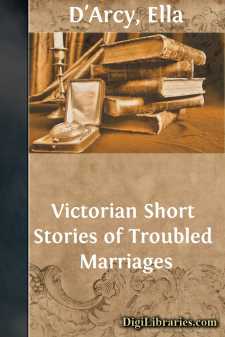Categories
- Antiques & Collectibles 13
- Architecture 36
- Art 48
- Bibles 22
- Biography & Autobiography 813
- Body, Mind & Spirit 142
- Business & Economics 28
- Children's Books 15
- Children's Fiction 12
- Computers 4
- Cooking 94
- Crafts & Hobbies 4
- Drama 346
- Education 46
- Family & Relationships 57
- Fiction 11828
- Games 19
- Gardening 17
- Health & Fitness 34
- History 1377
- House & Home 1
- Humor 147
- Juvenile Fiction 1873
- Juvenile Nonfiction 202
- Language Arts & Disciplines 88
- Law 16
- Literary Collections 686
- Literary Criticism 179
- Mathematics 13
- Medical 41
- Music 40
- Nature 179
- Non-Classifiable 1768
- Performing Arts 7
- Periodicals 1453
- Philosophy 64
- Photography 2
- Poetry 896
- Political Science 203
- Psychology 42
- Reference 154
- Religion 513
- Science 126
- Self-Help 84
- Social Science 81
- Sports & Recreation 34
- Study Aids 3
- Technology & Engineering 59
- Transportation 23
- Travel 463
- True Crime 29
Victorian Short Stories of Troubled Marriages
by: Ella D'Arcy
Categories:
Description:
Excerpt
THE BRONCKHORST DIVORCE-CASE
By Rudyard Kipling
(Civil and Military Gazette, 26 September 1884)
In the daytime, when she moved about me,
In the night, when she was sleeping at my side,—
I was wearied, I was wearied of her presence,
Day by day and night by night I grew to hate her—
Would God that she or I had died!
—CONFESSIONS
There was a man called Bronckhorst—a three-cornered, middle-aged man in the Army—grey as a badger, and, some people said, with a touch of country-blood in him. That, however, cannot be proved. Mrs. Bronckhorst was not exactly young, though fifteen years younger than her husband. She was a large, pale, quiet woman, with heavy eyelids over weak eyes, and hair that turned red or yellow as the lights fell on it.
Bronckhorst was not nice in any way. He had no respect for the pretty public and private lies that make life a little less nasty than it is. His manner towards his wife was coarse. There are many things—including actual assault with the clenched fist—that a wife will endure; but seldom a wife can bear—as Mrs. Bronckhorst bore—with a long course of brutal, hard chaff, making light of her weaknesses, her headaches, her small fits of gaiety, her dresses, her queer little attempts to make herself attractive to her husband when she knows that she is not what she has been, and—worst of all—the love that she spends on her children. That particular sort of heavy-handed jest was specially dear to Bronckhorst. I suppose that he had first slipped into it, meaning no harm, in the honeymoon, when folk find their ordinary stock of endearments run short, and so go to the other extreme to express their feelings. A similar impulse makes a man say, 'Hutt, you old beast!' when a favourite horse nuzzles his coat-front. Unluckily, when the reaction of marriage sets in, the form of speech remains, and, the tenderness having died out, hurts the wife more than she cares to say. But Mrs. Bronckhorst was devoted to her 'Teddy' as she called him. Perhaps that was why he objected to her. Perhaps—this is only a theory to account for his infamous behaviour later on—he gave way to the queer, savage feeling that sometimes takes by the throat a husband twenty years married, when he sees, across the table, the same, same face of his wedded wife, and knows that, as he has sat facing it, so must he continue to sit until the day of its death or his own. Most men and all women know the spasm. It only lasts for three breaths as a rule, must be a 'throw-back' to times when men and women were rather worse than they are now, and is too unpleasant to be discussed.
Dinner at the Bronckhorsts' was an infliction few men cared to undergo. Bronckhorst took a pleasure in saying things that made his wife wince. When their little boy came in at dessert Bronckhorst used to give him half a glass of wine, and, naturally enough, the poor little mite got first riotous, next miserable, and was removed screaming. Bronckhorst asked if that was the way Teddy usually behaved, and whether Mrs....


